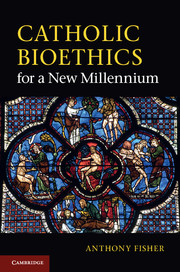Book contents
- Frontmatter
- Contents
- Foreword
- Abbreviations
- Introduction
- PART I How are we to do bioethics?
- PART II Beginning of life
- PART III Later life
- Chapter 7 Transplants: bodies, relationships and ethics
- Chapter 8 Artificial nutrition: why do unresponsive patients matter?
- Chapter 9 Endings: suicide and euthanasia in the Bible
- PART IV Protecting life
- Index
- References
Chapter 9 - Endings: suicide and euthanasia in the Bible
from PART III - Later life
Published online by Cambridge University Press: 05 June 2012
- Frontmatter
- Contents
- Foreword
- Abbreviations
- Introduction
- PART I How are we to do bioethics?
- PART II Beginning of life
- PART III Later life
- Chapter 7 Transplants: bodies, relationships and ethics
- Chapter 8 Artificial nutrition: why do unresponsive patients matter?
- Chapter 9 Endings: suicide and euthanasia in the Bible
- PART IV Protecting life
- Index
- References
Summary
Contemporary readings
A complete study of what the Scriptures might say about end-of-life issues such as suicide and euthanasia would require a thoroughgoing exploration of themes such as life, ageing, disability, suffering, death and after-life, violence and non-violence, creation and stewardship, individual and community, responsibility and blame … Rather than attempt that mammoth task in this chapter, I review the various reports of suicides in the Bible and some other texts, to see what they might say to us today. In doing so I recognize that there are many ways of reading the Scriptures and that each raises its own methodological problem. We must be wary both of an uncritical, fundamentalist reading and of a secularized, Bible-as-ordinary-literature treatment of the sacred text. There is a risk that we will import our previous conclusions to our reading of texts, finding our prejudices conveniently confirmed there. Moreover, it is far from clear how we are to bridge the gap between an ancient text with its particular form, language, audience and concerns and early twenty-first-century readers for whom words like ‘suicide’ are charged with considerable (if variant) descriptive and normative content. In addition to all these hermeneutical problems, there are others such as the specificity of Christian ethics, the rôle of Scripture vis-à-vis other sources of morality, the relationship between moral norms, situations and applications and the unique aspects of any particular case of suicide or euthanasia, attempted or actual, assisted or carried out alone.
Recently, there has, however, been some important scholarly literature on the subject. I examine three examples in this chapter: Arthur Droge and James Tabor’s A Noble Death: Suicide among Christians and Jews in Antiquity, James Clemons’ What Does the Bible Say about Suicide? and several essays by Paul Badham. Droge and Tabor’s book comes with a back-cover accolade from Derek Humphry, founder of the Hemlock Society, and opens with a friendly reference to Jack Kevorkian, the infamous ‘Dr Death’, who until his imprisonment regularly assisted in the suicides of sick or depressed people. Droge and Tabor are very clearly exegetes with a mission: a mission to show that suicide and euthanasia were permitted to Jews and Christians, even commended, well into the first few centuries of the Christian era; that they therefore enjoy the warrant of Scripture and early tradition; that opposition to voluntary death is a late invention, the product especially of that archfiend of the Christian story, Augustine of Hippo; and that we should recover the purity of the Judeo-Christian revelation by supporting contemporary moves to permit voluntary death. Clemons, writing from a more pastoral perspective, is more moderate, but he too argues that the terminally ill should be able to choose death, and that the Christian community should offer them the latest and ‘least violent, painful, messy, bothersome’ methods. Badham is a fan of Droge and Tabor’s work and a campaigner for the view that ‘Bible-believing Christians can legitimately choose death for themselves.’ He believes that Christian leaders in Britain and elsewhere have been mistaken in holding out against the legalization of ‘humane’ killing. If the political advocacy of these authors gives cause for caution about their readings of the texts, it must be admitted that they are by no means alone in seeking scriptural warrant for their political ends. Nor are they alone in asserting that the Scriptures never forbid suicide or euthanasia.
- Type
- Chapter
- Information
- Catholic Bioethics for a New Millennium , pp. 248 - 272Publisher: Cambridge University PressPrint publication year: 2011



